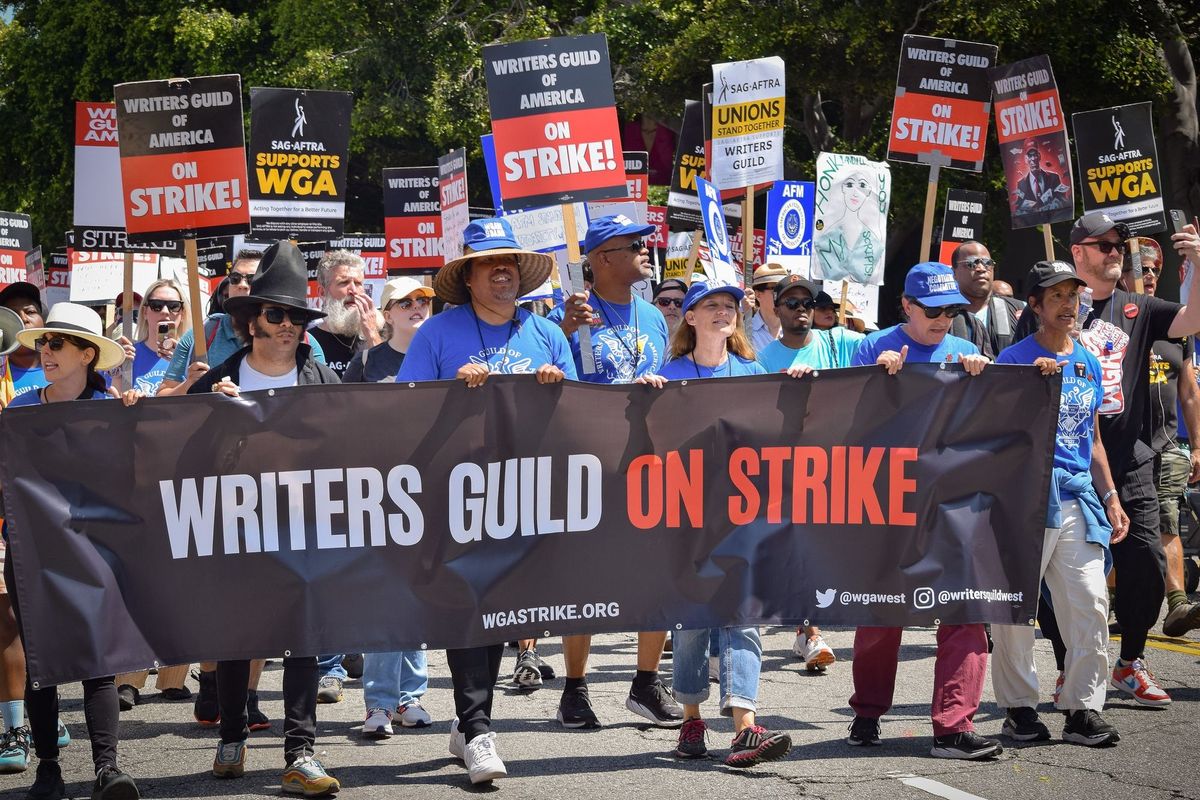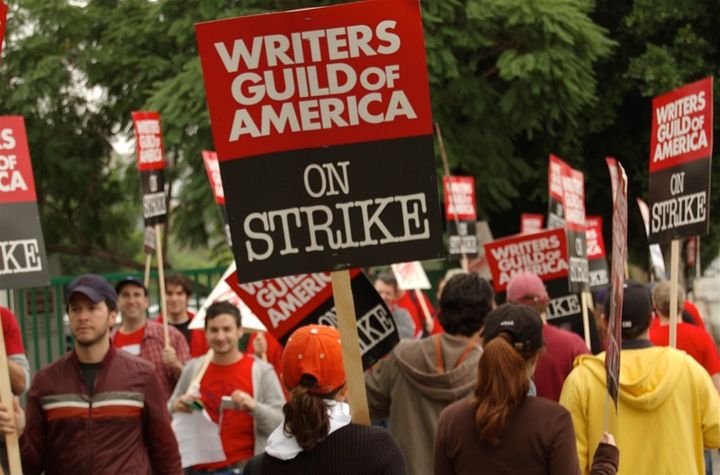From support staff to showrunner, writers look back at the WGA strike and how it changed them.
As promised, here is part two of the Official Humorism WGA Strike Retrospective. Putting this together, I realized I inadvertently saved a bunch of longer responses for this part (again: thank you to everyone who took the time and care to participate in this!) instead of distributing them evenly throughout the two, which, my bad, but on the other hand I think this makes for some very good Sunday reading over a cup of coffee or what have you.
I’ll just say upfront that I'm struck by how many of these writers said they were surprised by the cross-union support they received, and moved to show up for other unions in future strikes. I think this might lend some support to Erik Baker’s argument in the essay I cited the other day—that unions should reconsider the value of strikes as a routine tactic as opposed to a last resort. Clearly their power to raise class consciousness and boost solidarity across industries is not to be understated.
Anyway—below are some strike reflections from Megan Amram, Rusteen Honardoost, Caitie Delaney, Will Landman, Alex Wolinetz, Liz Hynes, Ceda Xiong, and Ariel Dumas. Thanks as always for reading, and see you next week.
Megan Amram: “Every single level of writer had been mistreated for so long that we all needed a huge change.”
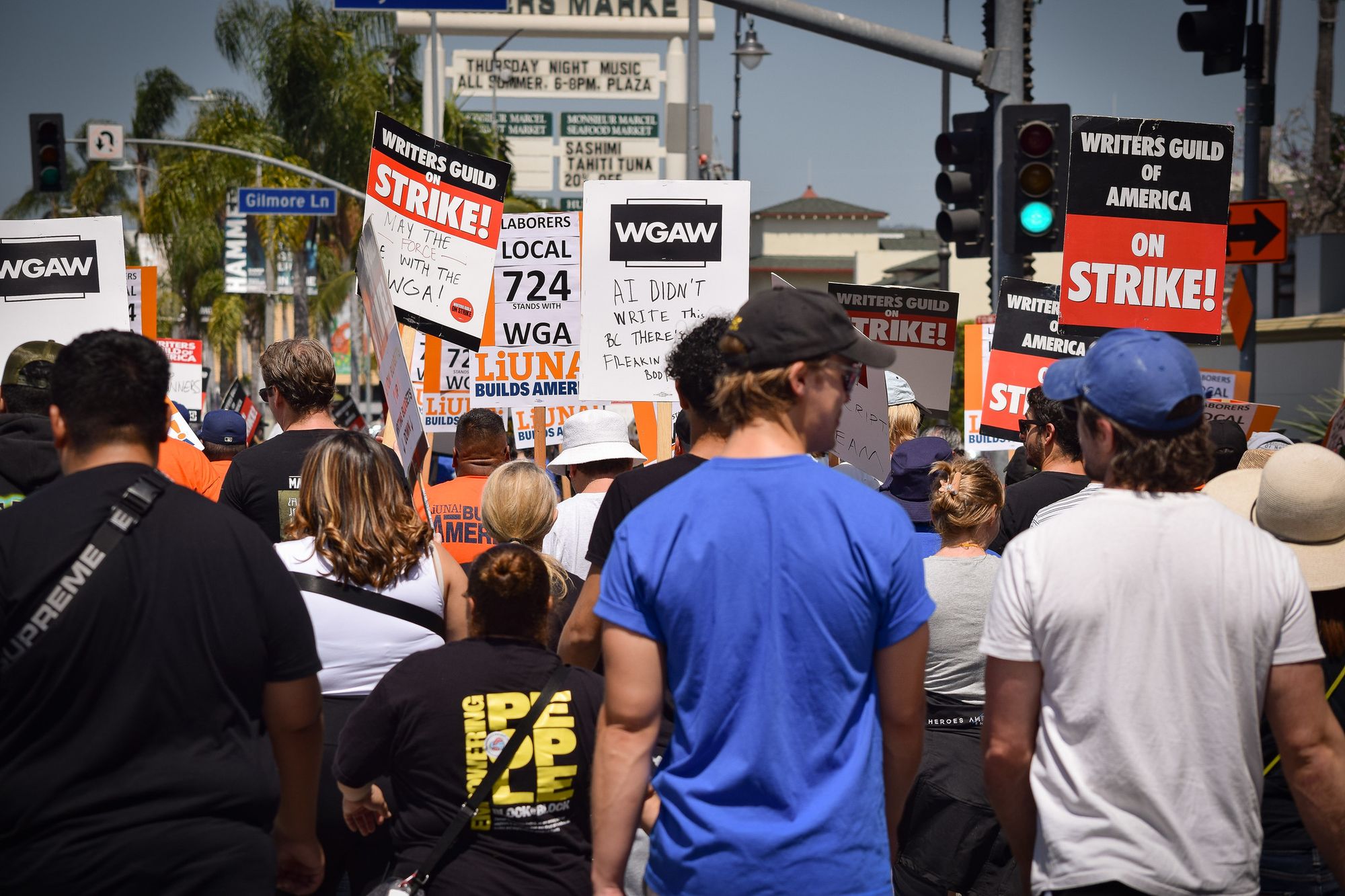
As Pollyanna-ish as it might sound, I truly believe in the power of collective action now. I tend towards the cynical and was not certain at the beginning of the strike that we as a guild could wield any leverage in a time of monstrous capitalism and consolidation of mega-companies and AI that can give these corporations the scintillating mediocrity they crave. It's hard to not anthropomorphize these studios: they feel like horror movie monsters eating everything they can see. Or like when Tetsuo becomes a big blob in Akira.
But I do believe the studios we struck against underestimated a few things. They underestimated how little anyone on our side had to lose. When some anonymous exec said that they'd wait for the writers to lose their houses, everyone on the picket line laughed, because so few of us own a house. The CEOs have been uber-rich for so long that I honestly do not think they remember what it's like to live normally. They underestimated the solidarity within the ranks of the WGA—as far as I can tell, the 2007-08 strike was plagued by in-fighting between the high-echelon showrunners and the lower-level writers just entering the guild. But this go-around, every single level of writer had been mistreated for so long that we all needed a huge change in our profession. With a uniformity of purpose, I do now believe that a lot is possible.
I learned that who you are on the picket line is who you are in real life. There were writers who came out every day, rain or shine, and there were writers who did not picket once and were satisfied to allow others to do the heavy metaphorical lifting for them. I am a recovering theater kid (in remission) who got a lot of personal satisfaction from being there almost every day as a captain, helping keep attitudes high, helping out in whatever way I could. I never chastised my friends who didn't come out, because I don't think you can or should try to teach the concept of civic duty to a grown adult, but I can tell you that I was very happy and fulfilled to be able to be a leader in this way.
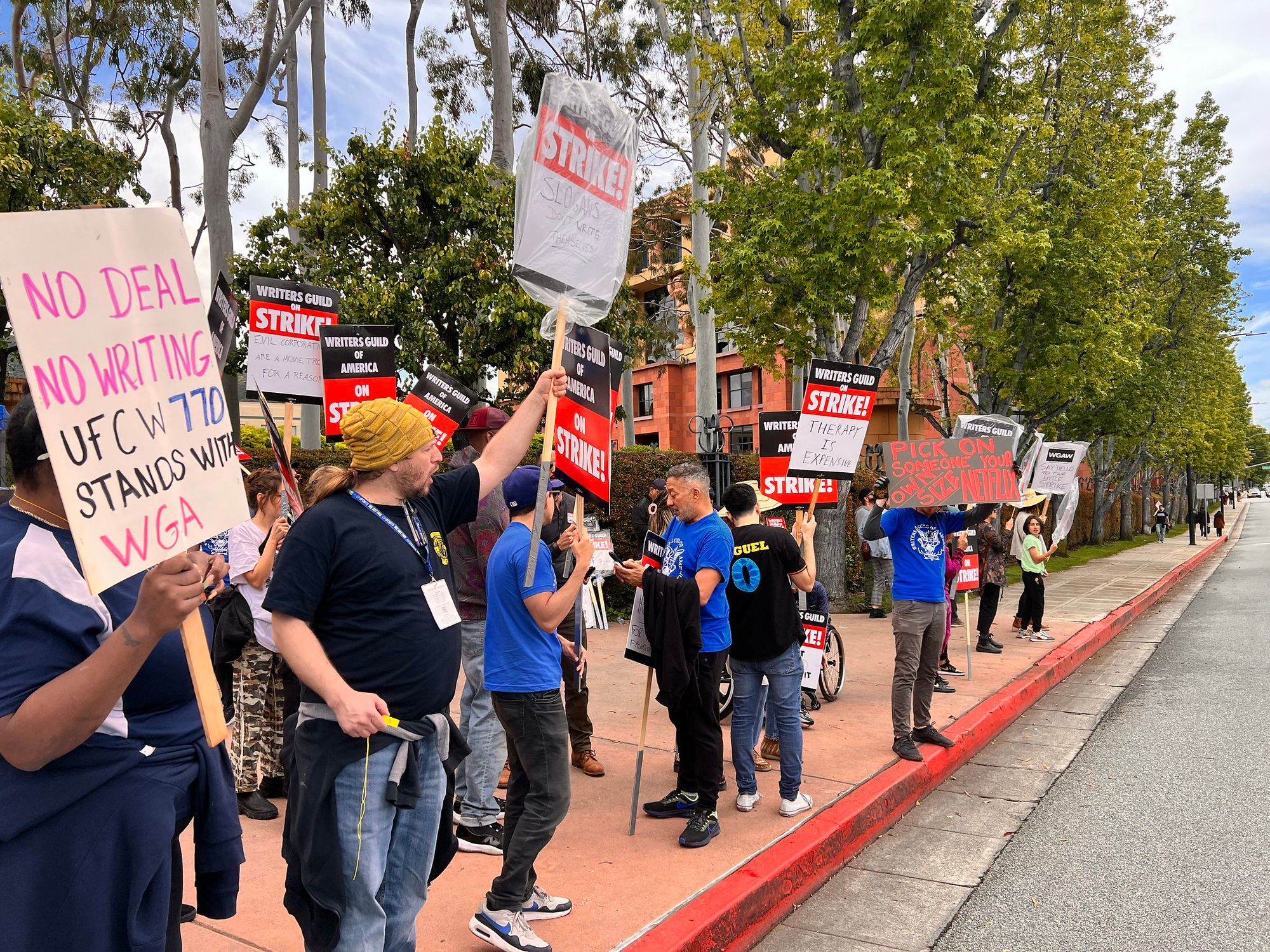
I have tried to get more and more involved in progressive politics as the years have gone on through organizations like the DSA and local politics and mutual aid, but this is the first time I'd been a part of labor action, and I absolutely will join other industries' picket lines in the future. It feels so immediate and powerful to withhold labor and to join in the camaraderie of other unions. And I can tell you that fellow progressive writers on the line have been labor-pilled in the same way.
It was also a true gift to be able to meet writers of different genres. I know it sounds silly, but I basically know every single TV comedy writer in Hollywood and almost no other writers of other media. I got to meet drama writers, late-night writers, soap writers, and feature writers on the line, and that was a gift. I think it's very important that the guild look out for every writers of all genre and level, so I liked having that awareness.
We would not have had the leverage we had if it weren't for the solidarity of IATSE and all the crew members who vowed to stand with us.
The class distinctions within the guild are obvious and glaring—there are many different levels of writers with many different levels of income. I found it disingenuous to act as if that weren't true—I was always going on on the line about how I think it is the responsibility of showrunners, like myself, to picket more, allowing the newer or lower-level writers to get other side hustles and/or take care of themselves. I was pleasantly surprised at the responsibility a lot of showrunners felt to take care of lower-level writers, but am similarly cynical that this was a biased sample (since it was the people I met who picketed) and that there's more selfishness within the upper ranks than I got to see up close.
I am still a bit cynical about the longevity of our solidarity with our "sister" unions. I need the WGA to stand with IATSE if and when they decide to strike. We cannot cross their picket lines. We would not have had the leverage we had if it weren't for the solidarity of IATSE and all the crew members who vowed to stand with us. My worry is that the writers will forget the below-the-line crew now that our professional lives are "returning to normal," and slink back into their class bubbles.
Rusteen Honardoost: “This kind of class consciousness was unfathomable just six months ago.”
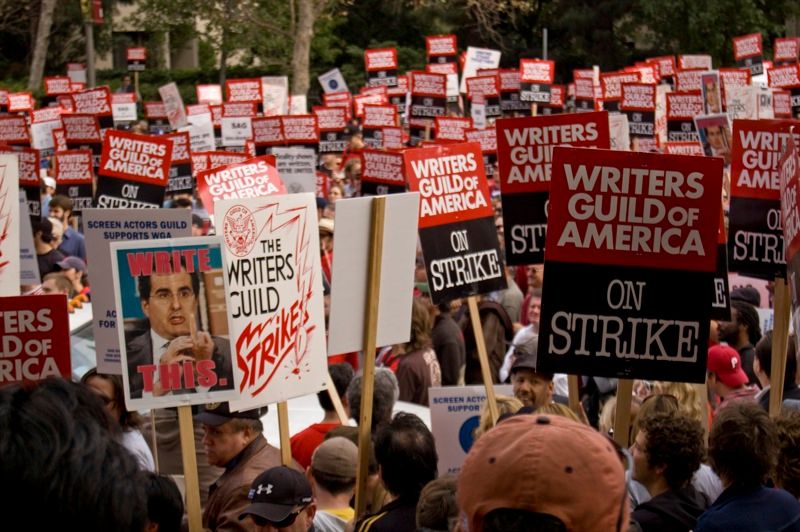
The WGA came into negotiations with a wide range of issues they wanted to address, and while they were united, they were also fighting against some of the biggest, most evil corporations on the planet. But seeing the solidarity radiate off of WGA and start to pull in SAG-AFTRA, IATSE and Teamsters was truly inspiring. Through this strike, workers at every level of Hollywood, from the lowest-paid assistants to the most high-profile writers and directors, have started to recognize that they have more in common with each other than they do with the bosses who sign our checks. This kind of class consciousness was unfathomable just six months ago, and it's made me reevaluate just how far us workers can push this industry to become truly equitable to everyone who's labor makes it so profitable.
I, like many workers in Hollywood, don't necessarily have a lot of organizing experience personally. But over the past 140+ days, I saw myself and many others on the lines grow as organizers, learning how to do one-on-ones, how to organize events, and how to mobilize people. Through my work in DSA-LA's Hollywood Labor, I have grown so much as an organizer through our work bringing food and supplies out to the picket lines every single day, and I know I'm not alone in feeling like I'm not only a better organizer but a better person coming out of this strike.
It's easy to get fired up about your own union contract, but in the past we haven't necessarily seen writers come out in support of other union or political struggles that don't directly affect them. That has completely changed now. After the strong showing of solidarity from unions both within Hollywood (Teamsters, IATSE) and outside of the industry (teachers, hotel workers, autoworkers, medieval times workers, our newly unionized strippers), I have personally seen writers getting more involved in the broader labor movement, which has the potential to radically reshape politics both within LA and California and beyond.
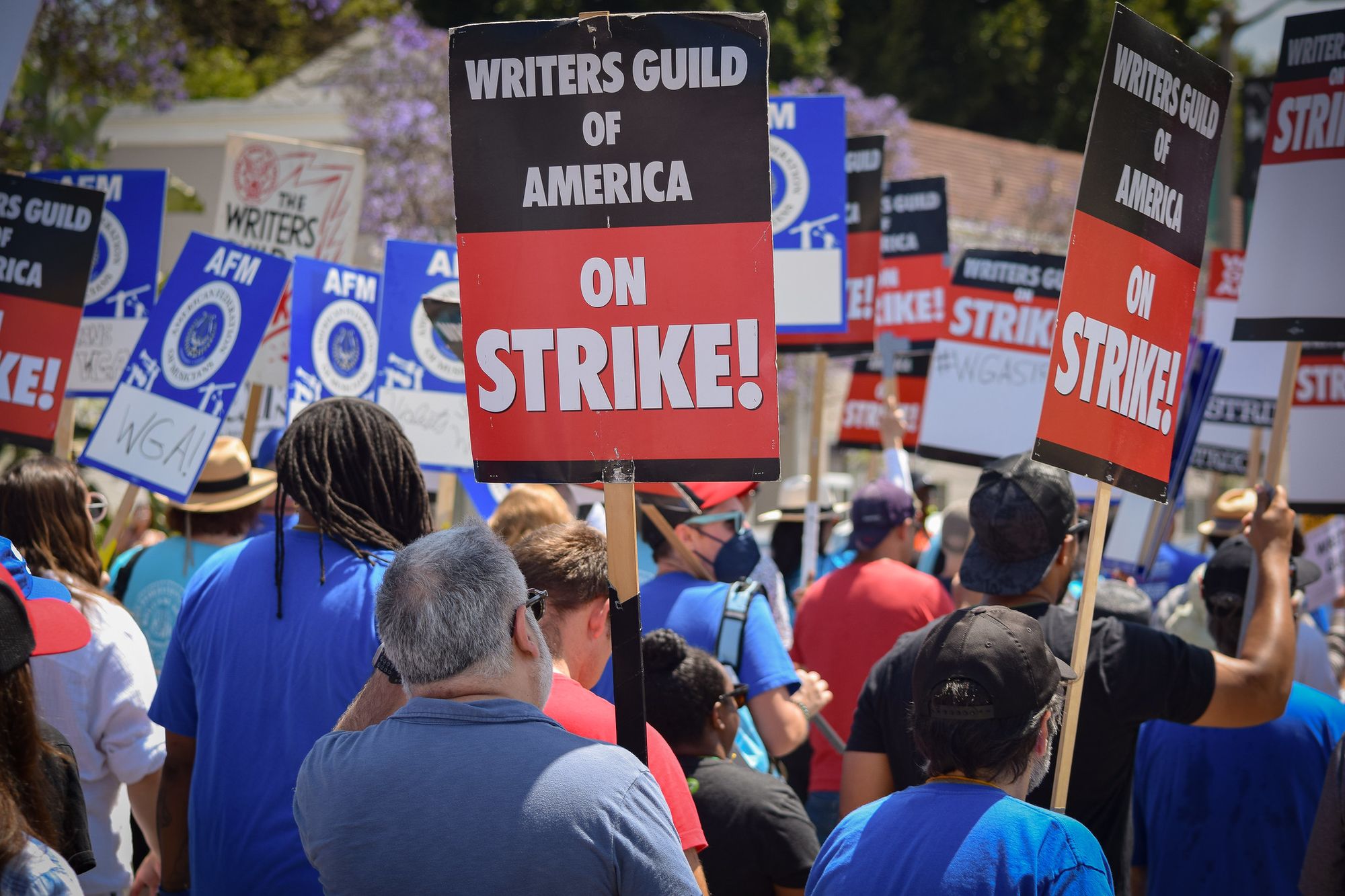
What still makes me cynical is the way neoliberal politicians who have enacted the very policies that have weakened unions and hurt workers are still warmly received by Hollywood. Adam Schiff is a celebrity here despite a long career of boosting the military industrial complex while ignoring issues in his own district, we had several local politicians join the picket lines for a photo op despite being backed by the real estate/developer lobbies that have made LA prohibitively expensive for the working class, and while Gavin Newsom might be a pariah right now because of a handful of terrible vetoes, are they going to remember all that when he inevitably comes through town looking for big donations to his 2028 presidential campaign? That remains to be seen.
As a part of DSA-LA's Hollywood Labor subcommittee, we organized the Snacklist to bring food and supplies out to the picket lines. When we first created the program, we had no way of knowing whether it would be successful or not, especially when we put out the call for volunteers to help make the deliveries happen. So I was shocked when when we had over 100 volunteers sign up to join our team. As we started making calls to get them onboard, we learned that a majority of these volunteers don't even work in Hollywood: they saw a labor struggle happening in their backyard and wanted to get involved. They didn't want to sit on the sidelines. They wanted to be a part of that fight, even if they had nothing to gain from it themselves. It is the textbook definition of solidarity, and those conversations we had will always stick with me.
Caitie Delaney: “Shit has gotten incredibly real over the last few years.”
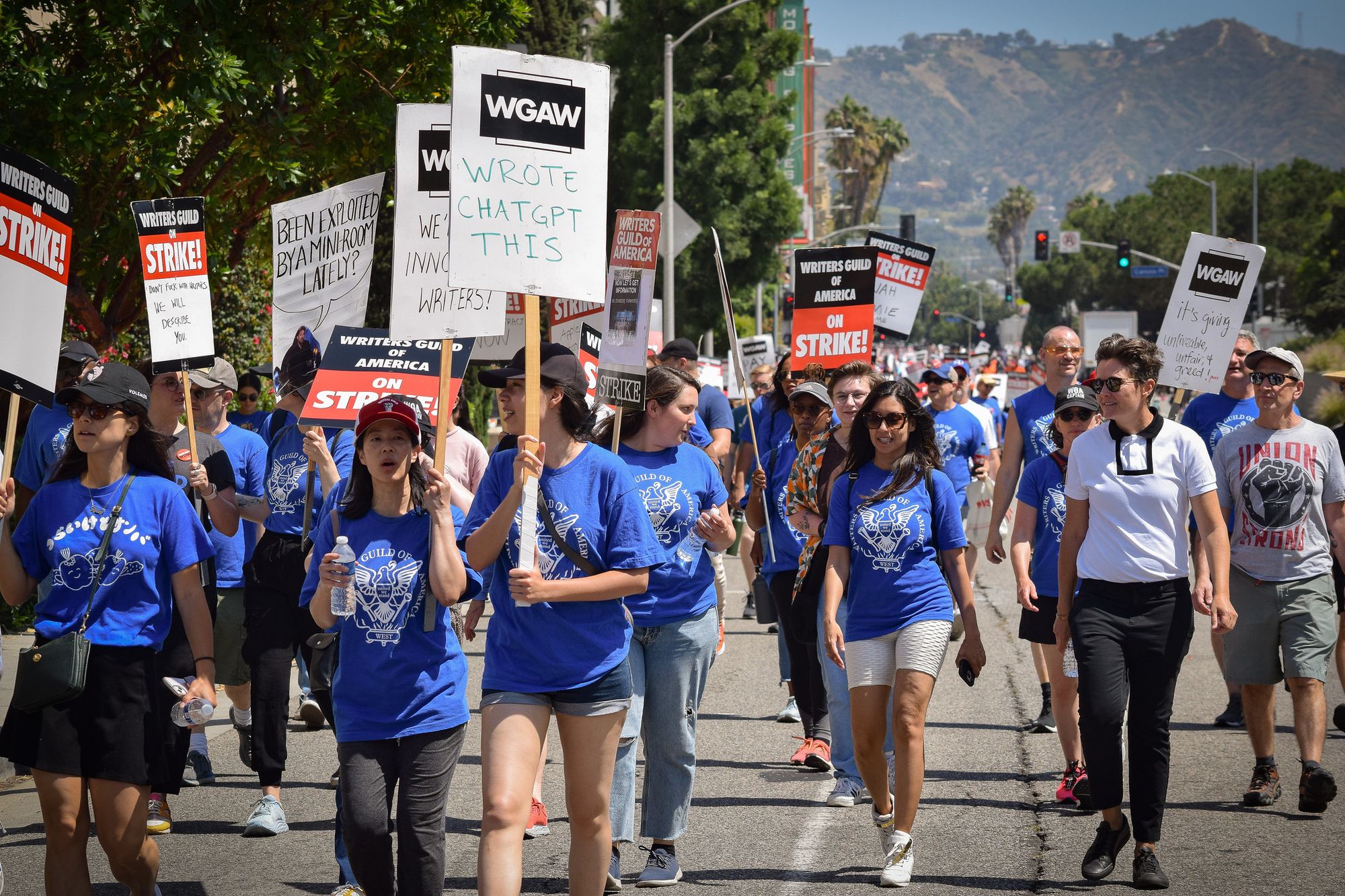
What I realized going on strike is how little attention I paid before—really for me it was another installation in the ongoing veil-lifting we've been experiencing over the last few years. These companies don't give a shit about you, the expectation of exponential growth is ruining everything, and the gap between working people and billionaire CEOs is... so fucking unfathomably huge.
I think up until now, one of the side effects of my imposter syndrome has been some misplaced gratitude for simply being allowed to be here. I'm so grateful I get to write for a living, I still can't believe it most of the time, so when I'm offered money to write, I immediately accept—I don't question if I should be earning more. I didn't pay attention to fine print of any kind. It would make sense to me if this has happened across-the-board for writers before. We love what we do, it's crazy we get to do this, it's competitive as hell out there, so to be offered a job of any kind is incredible and I think the companies have taken advantage of that dynamic. It shows in their multiple statements telling us we should be grateful for their lowball or no-ball offers.
I think what was different this time was this strike coming along on the heels of a really big awakening societally—pandemic, Trump, cops, racial injustice, climate change—shit has gotten incredibly real over the last few years, we understand now more than ever that it's the fault of people in power, and we're no longer accepting any kind of status quo. It rocks. I hope it keeps going in every industry, for every union, across the board I hope people understand the power is in their hands.
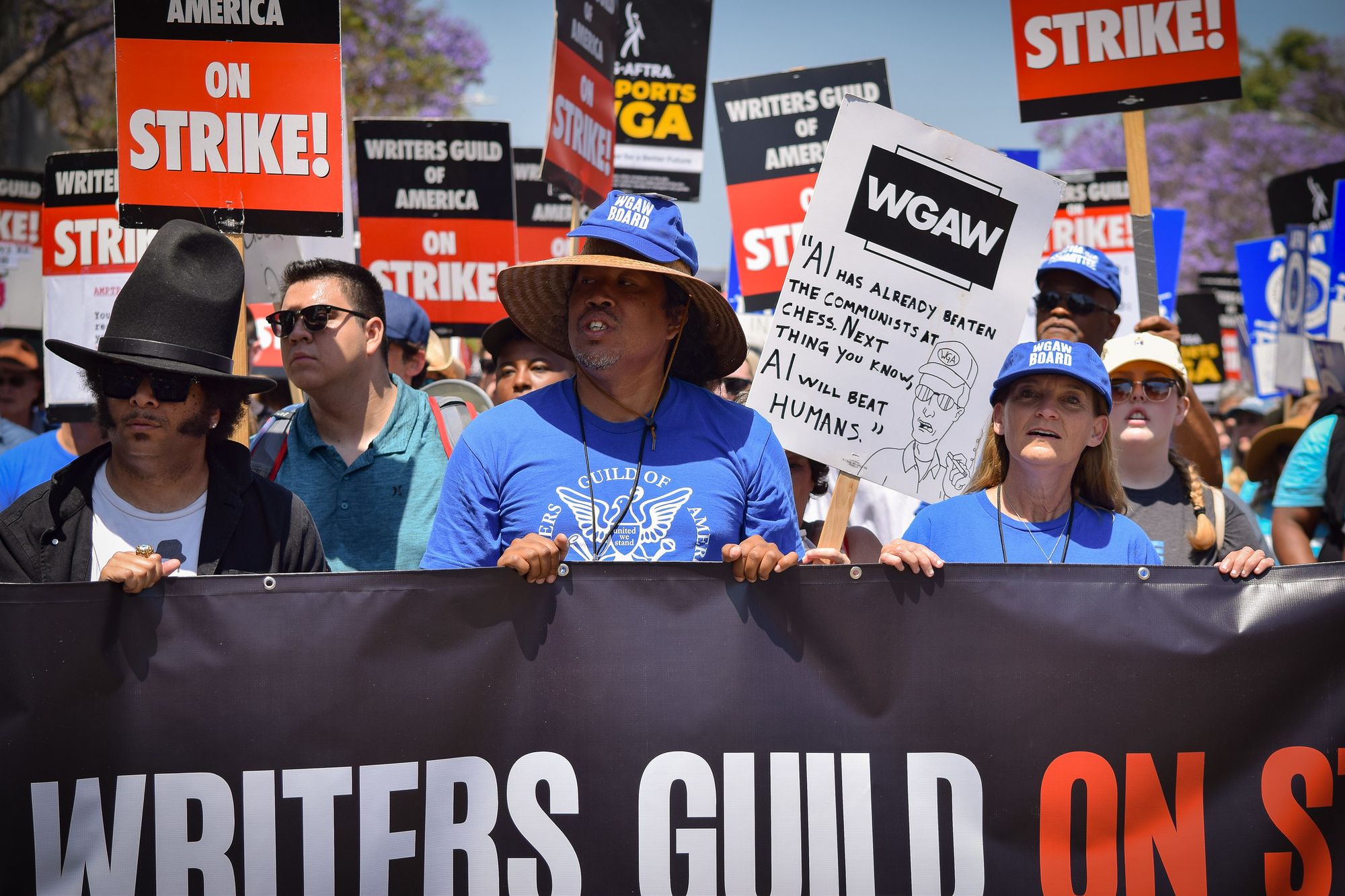
I remember thinking at the beginning of the strike that I'd feel awful out on the picket lines—seeing the number of people who do what I do, who are so good at it, that I would see purely as competition. Thankfully that didn't happen at all. I felt such community with them and it really was a "we're all in this together" moment. There's room for all of us and more.
Going back to work for these companies is likely going to be a challenge. It's going to be strange being expected to put on the smile again and pitch my little shows and act grateful for the opportunity as if they didn't literally say they wanted to starve us out, let us lose our homes, etc. I trust that the vast majority of people who work at the companies do so because they love tv and movies, they want to uplift creators, they want collaboration—I love them! They're our friends! But man... their bosses fucking suck and that'll be hard to shake. There's no way my cynicism about where this industry is ultimately headed if it remains in the hands of greedy CEOs is going anywhere.
Will Landman: “Labor is not to be trifled with.”
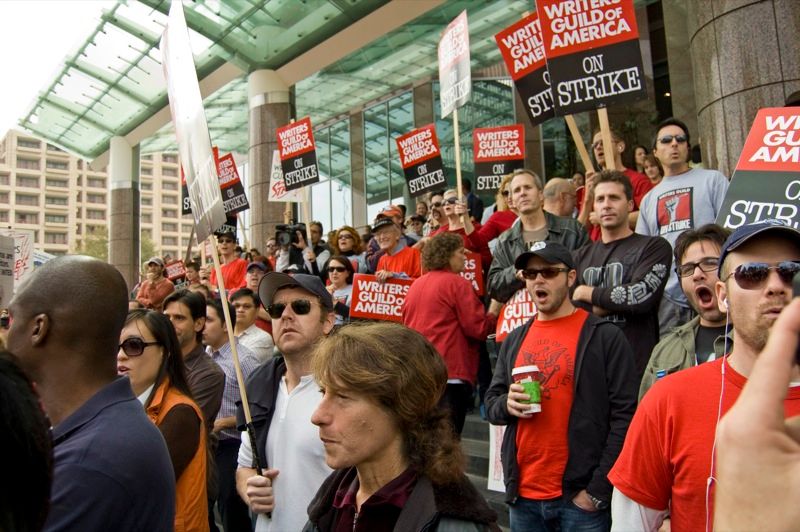
The strike showed me personally that labor is not to be trifled with at any point. We know our value and stood up for what we were owed. I think that sense of confidence and resolve is something I hoped Hollywood was capable of but I got to experience it on the frontlines for 148 days. I learned to be confident in myself — to speak up for what is right and not stand down because of intimidation. We all found our voices to speak up and I think that’s going to reverberate through the younger generation of writers for years to come.
I was a bit cynical about the fixing of the ladder—I wasn’t sure if the WGA would get minimum staffing requirements, so I was extremely happy and hopeful for a future where support staff can finally make the jump to staff writer on a regular basis. I think I’m still a bit cynical on the treatment of support staff—it still seems the studios are going to try to penny pinch and abuse support staff so it can save them money. I hope with the next IATSE negotiation some of this can be resolved.
I’ll never forget the Simpsons-themed picket at FOX. The Simpsons got me through the pandemic and has become a true comfort show for me, so to talk to folks like Conan O’Brien and Michael Price was really special. The moment that will stick with me for years to come though was meeting Matt Groening—pitching him a joke and watching him draw Lisa Simpson. He wrote at the bottom of the sign, “Written By Will Landman from the picket line.” He asked me if I wrote for The Simpsons and I blurted out, “I wish!” He then bestowed the sign to me and said, “You have now written for the Simpsons!”
Alex Wolinetz: “It's crucial that this fight not just be a blip.”
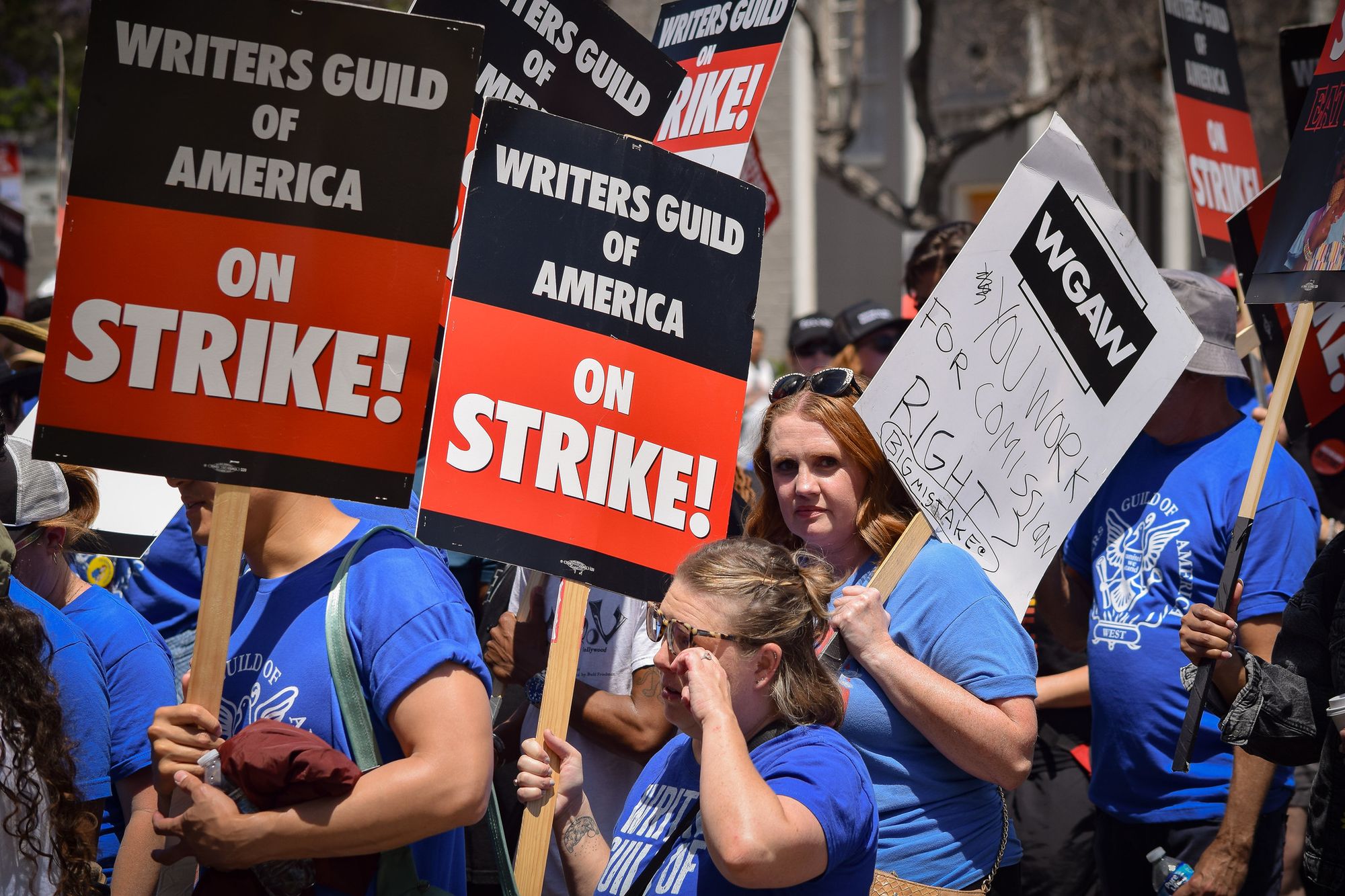
When the strike started, I organized with DSA-LA's Hollywood Labor Circle a fundraising campaign to bring food and supplies to the picket lines. Never did I imagine we'd raise over $80,000 from folks across the globe, and then have DSA members make over 400 (and counting!) deliveries of food to the picket lines across LA. I think entertainment industry workers have a hard time identifying themselves as workers with similar struggles. Having over 4000 people donate an average of around $20 showed me and I think shows that our fellow workers are behind us. It's all one big fight against the bosses, and the sooner we all recognize that, the better.
I learned that it's very bad for our collective body issues to have to march in 90 degree heat with the most attractive people in the world in athleisure. But also, I think it, if only for a few months, everybody got to talk to each other just as fellow writers and workers. I was terrified to talk to Conan O'Brien on the picket lines—how would I tell him that I stole so much of my personality from him? But instead, it was a very normal, pleasant chat for 20 minutes about our lives and the strikes. It's a reminder that we all have a lot more in common than what separates us.
Having so many unions showing up for WGA from beyond the entertainment industry, like UTLA, SEIU, NNU—those were my favorite days on the line
I was worried before the strike that some writers would view a work stoppage as a novelty and focus more on who could write the funniest sign. I think it's crucial that this fight not just be a blip, but an affirming moment for writers that they need to be more involved with building a better world for themselves, their industry, and their neighbors. I'll often ask writers where they're from, and when they say New York, Chicago, etc, I say, “You pay taxes in LA. Your kids go to school in LA. Your neighbors live in LA. You're from LA, and you should care about what's happening in LA.” and I hope people start to take that message to heart.
When UNITE HERE 11 hotel workers went on strike on July 4th, I went to join WGA members to support their picket lines downtown. It was incredibly emotional—talking with hotel workers and them telling writers, through tears, about how happy they were that we had shown up in solidarity. A friend pointed out that the same billionaires that own these hotels are the same that own the studios. Having so many unions showing up for WGA from beyond the entertainment industry, like UTLA, SEIU, NNU—those were my favorite days on the line.
Liz Hynes: “You cannot starve that kind of willpower out.”
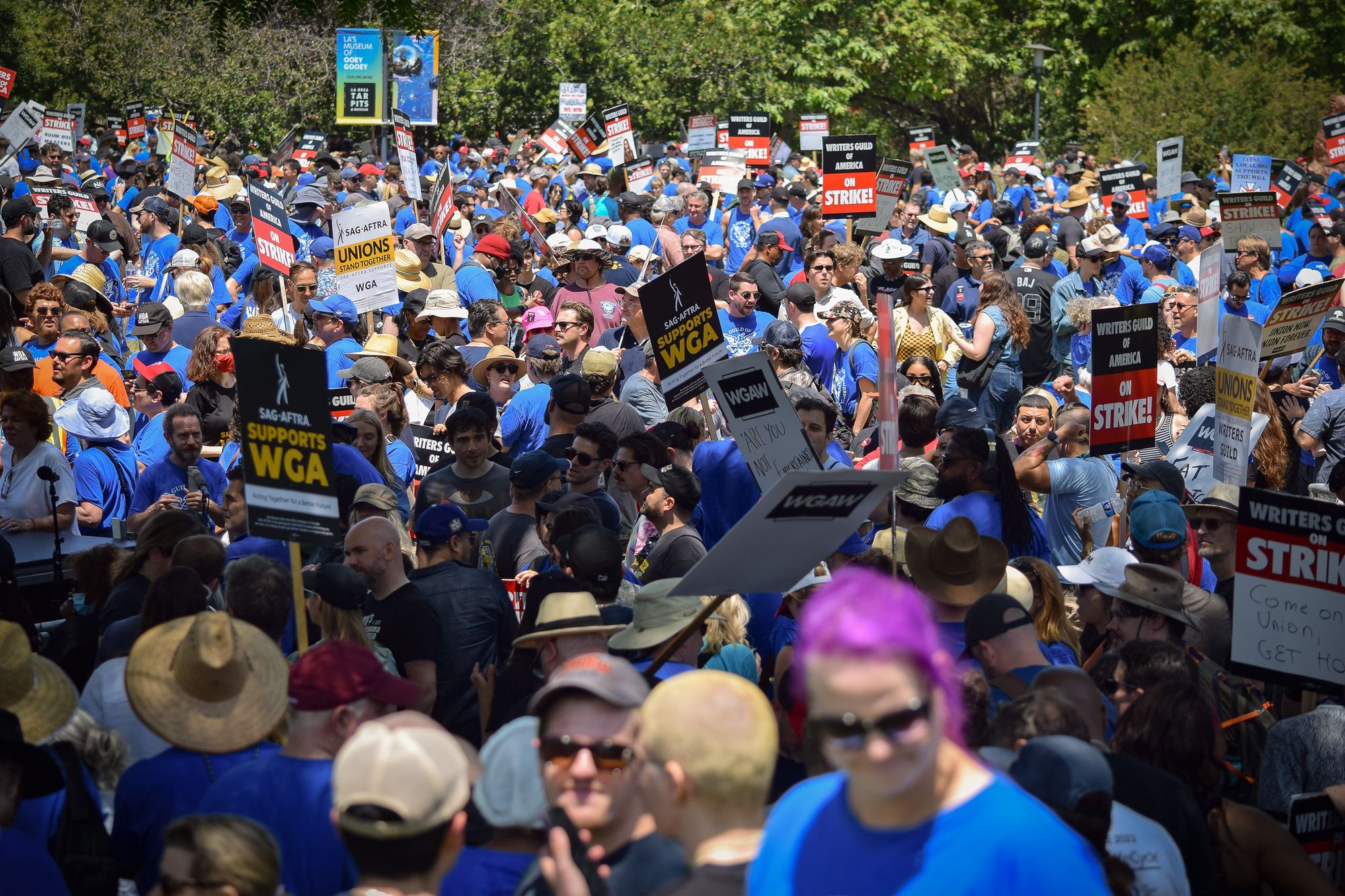
The inter-union solidarity we experienced was unbelievable. There are people who get paid a lot of money to go on TV and sow discord by pitting workers against each other. Any WGA picket line was proof that rhetoric is bullshit. SAG-AFTRA had their own check-in tent from day one. Unions representing not just entertainment workers, but teachers, grad students, UPS drivers, nurses, Amazon warehouse workers, flight attendants, hotel workers, Starbucks baristas, auto workers, athletes, and Deliveristas all showed up in support. Labor with which most people interact recreationally—like the labor that keeps Amazon, Starbucks, hotels, UPS, and entertainment afloat—is still labor. I think this strike shifted a lot of people's idea of what "counts" as labor. If you have a boss who works way less and makes way more money than you do, you should have a union—even if Springsteen hasn't written a song about you.
The production shutdown pickets were also a complete surprise, and never part of the Guild's intended picketing process. Our plan was, as far as I know, to show up, make a statement, maybe get a little loud and annoying with the chanting. But on day one, the heads of IATSE and Teamsters locals phoned the WGA telling us they'd encourage their members to honor any lines we set up. That changed everything. The Teamsters have a protected right to honor a picket line codified in their contracts, but IATSE doesn’t—any crew members that chose not to cross our lines did so out of their own volition and expense. There was no guarantee they'd get paid for the day (they often didn't), or that they wouldn't be replaced on the job. It was an incredibly moving act of altruistic solidarity that studios were definitely not counting on, because selflessness is something beyond their imagination. The Writers Guild owes it to IATSE to show up in spades when it's time for them to negotiate their next contract.
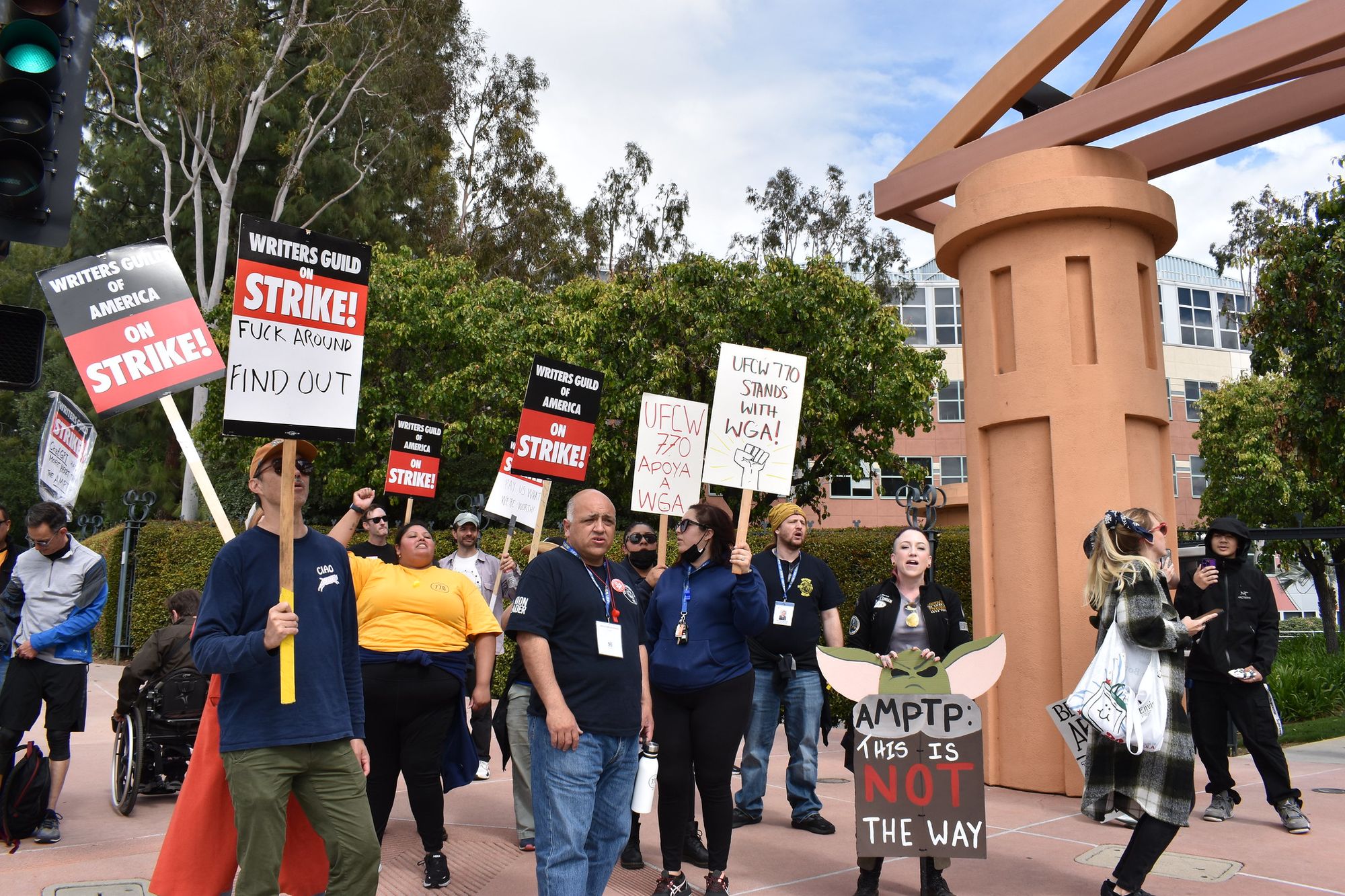
There are two ways to make your workforce dangerous: let them accumulate disposable income, or make them so insecure they become very accustomed to juggling 2-3 jobs at a time—either way, they can survive a strike for a while. Many WGA writers fall into one of those two categories, which means you've got a workforce ready and willing to get up at two in the morning to picket if necessary. You cannot starve that kind of willpower out.
I was anxious about how long we could maintain cross-union solidarity. It understandably became difficult for people, particularly crew, to go so long without work when this wasn't even their strike; and I started to worry how much our own folks could endure the constant hope-dashing and football-pulling by the AMPTP. I could not believe that our picket lines looked as strong on day 100 as they did on day one. I wasn't around for the '07 strike, but everyone who was would always say that was not the case back then!
One thing I'm still a little cynical about is that comedy writers are ill-suited to cultural moments requiring earnestness and vulnerability. I had to break a lot of irony-poisoned parts of myself to be an effective part of this strike. There were a lot of times, especially at the start, when I got thrown into situations where I was really uncomfortable speaking on behalf of the guild. But I got better and it was all worth it. Being too cool for solidarity is fucking lame!
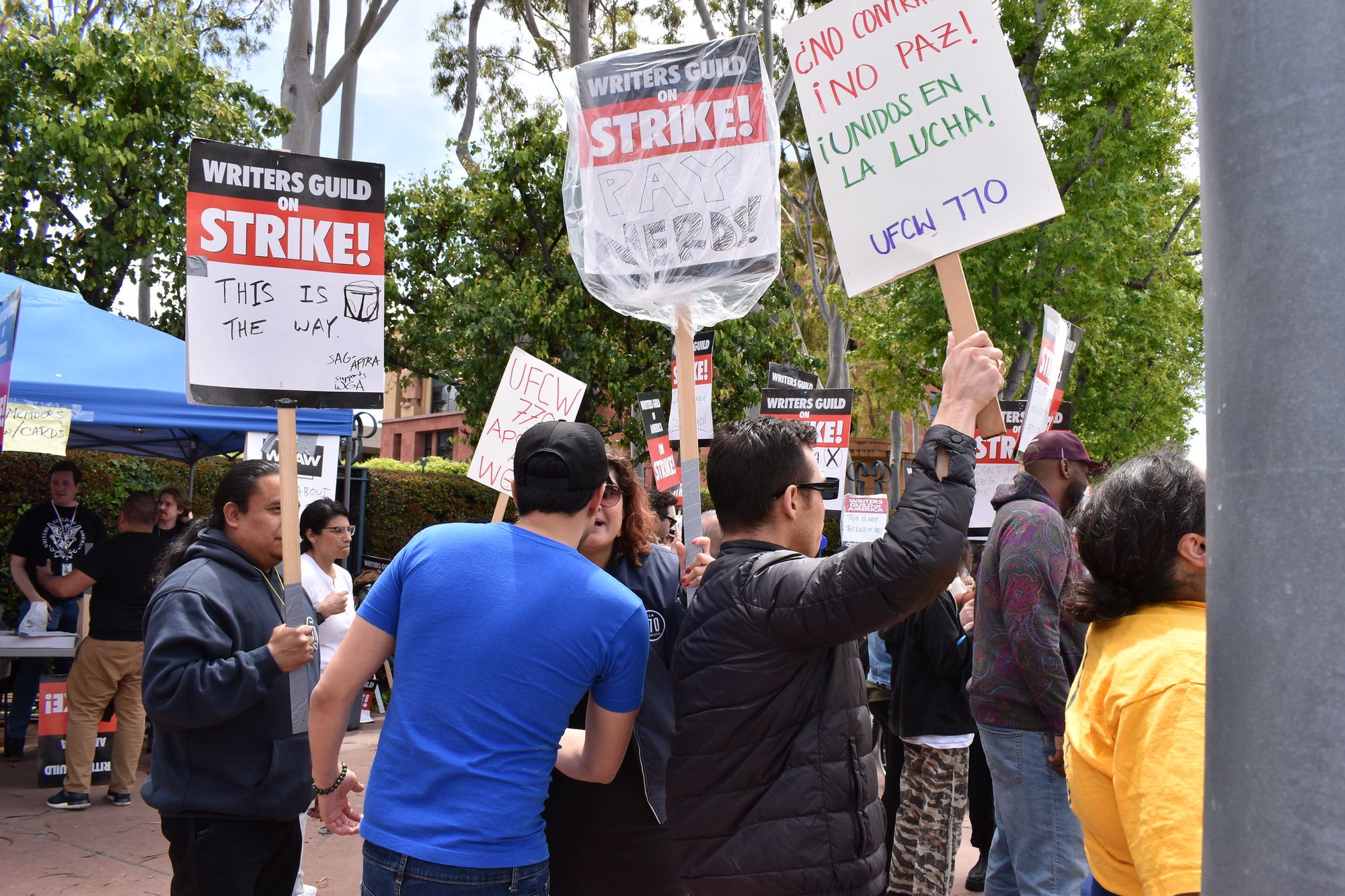
The production pickets had so many moments I hope people write about years from now. Like the day where nearly every crew member had to cross; the one holdout being an older crane operator without whom the day could not proceed. That was ideal because almost everyone got paid, but the studio couldn't accomplish anything—so thanks to that one guy's sacrifice, we were able to bleed out the real enemy.
Another morning I struck up a conversation with a Teamster, recognized his accent and asked where in Ireland he was from. Turns out he was from Sligo, near the same tiny town as my grandfather. We spoke for a bit, then he wandered back to his truck. Later we got a tip the studio was ushering people in (illegally!) through a neutral gate around the corner, where there was no picket line. I raced down there and saw the Sligo driver parked outside, refusing to cross even though he easily could have.
There was also a shoot up in Hudson Valley we arrived at too late to establish a picket line. A member of a local DSA chapter asked our staff if they needed any reinforcements. Our Director of Organizing, Justin Molito, jokingly said, "A noisemaker and a boat?"
Reader… they got a fucking boat.
Ceda Xiong: “We provide the value.”
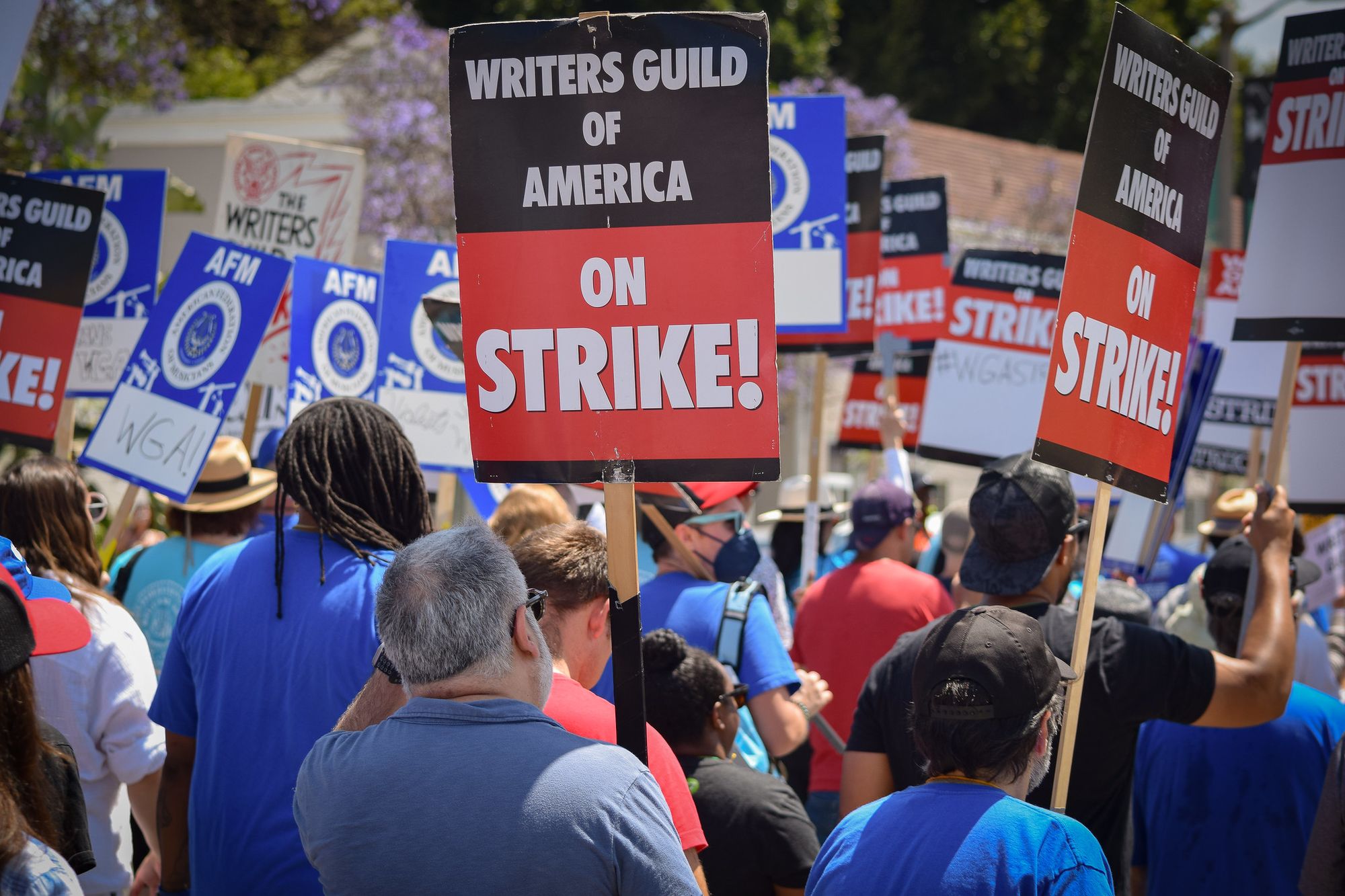
In the first days after the negotiating details came out, I was gobsmacked that the negotiating committee was able to accomplish more than our wildest dreams. We'd been prepared for the worst, that maybe AI would still be off the table, or room sizes would be the thing that killed negotiations. But when I saw the list of wins, it felt surreal. I thought the companies would never. But yet, they did. Hokas were finally hung up, captains could finally stop worrying about the short lights at Disney. I think this was a huge first step. We have protections and rights in place that no generations of TV writers who came before us did.
I'm not sure if Hollywood is representative of the world. We're a small bubble of 10,000 people who love stories and who want to afford a living while working for our billionaire overlords. Maybe this experience will make writers affable to the idea of collectivistic struggle? Maybe we stop writing those lone hero’s-journey stories. Who knows. We can only wait and see.
This was my first strike as part of my first union so it was a lot of new, unexplored feelings for me. I've been in LA since 2014, working so many assistant jobs before I finally broke in with a fellowship that picked me out of thousands of people. When I finally sat in a writer's room, I almost cried, but I didn't because it was a comedy room. My years of struggling paid off. But then when I got there, "there" was gone. TV writing had been slowly eroding into a gig-job for most writers, except for the most successful. If you got on two shows a year (insanely difficult to get on one show, let alone two), you could almost make a living.
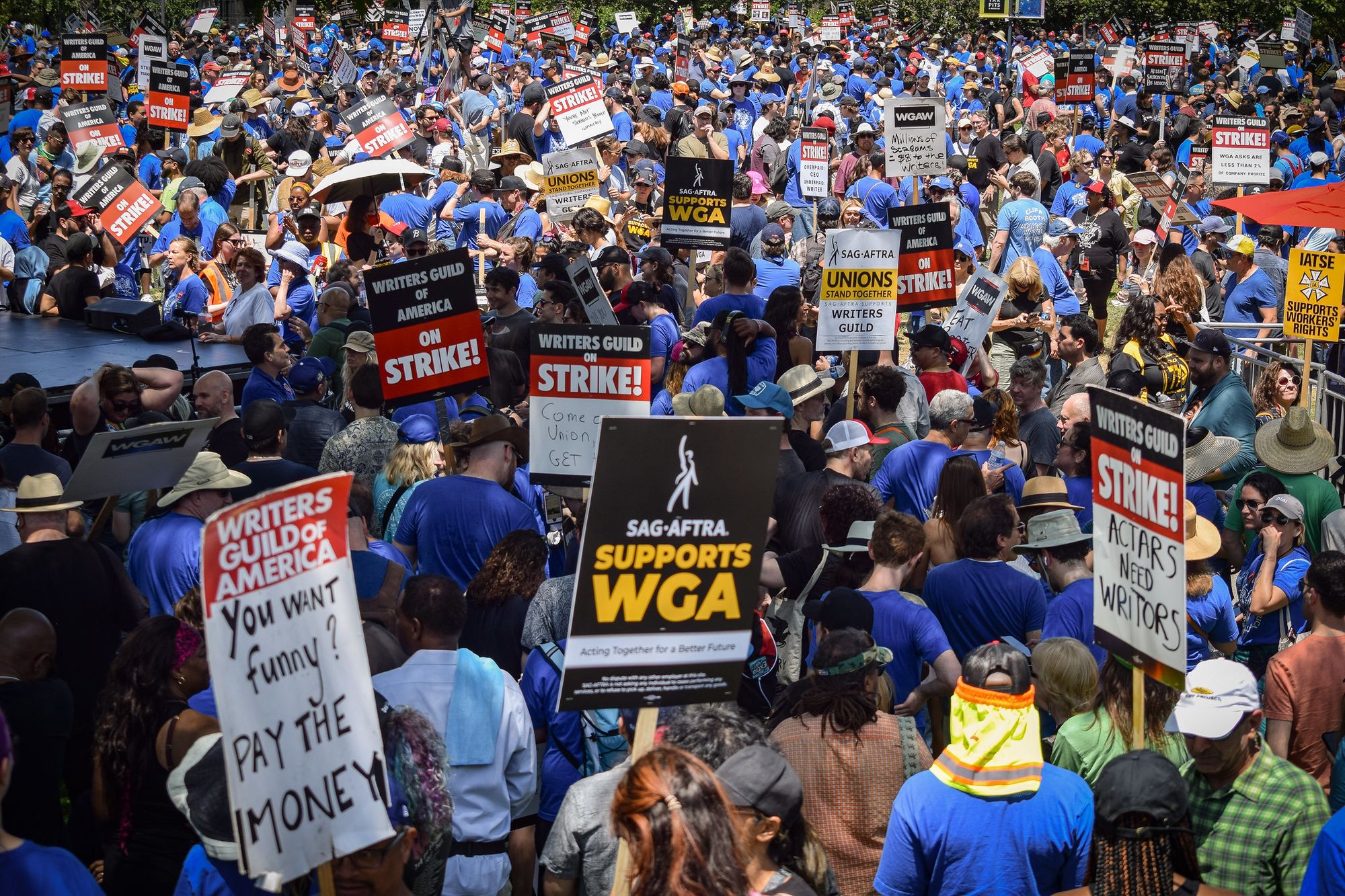
I was already into my 10th month of TV writing unemployment when the strike started. On May 1st, I got a residual check from Disney that could pay rent and the next day, I was already in front of the gates at Disney, waving a picket sign. There was no way I couldn't. The previous strike was the one that got me that residual check. I couldn't not be there. That motivation alone made me understand the strike in a succinct way, the generational debt that had to be paid so that people after us could fight another day. I know that the next step is enforcement of our wins, and that might make me cynical but right now I can bask for a little bit longer.
One moment that will stick with me is the night we were all gathered at the Shrine to vote for the strike authorization. All the unions gathered, WGA, SAG, DGA, IATSE, Teamsters, Local, SEIU 1000. The speeches were epic. The energy was insane. It made me feel good again, that work was on the side of the workers as it should be. Because we provide the value. I looked around and I was like this is why a bunch of people got blackballed in the 40s, not because they were dangerous, but because they had power.
Ariel Dumas: “The future is in good hands.”
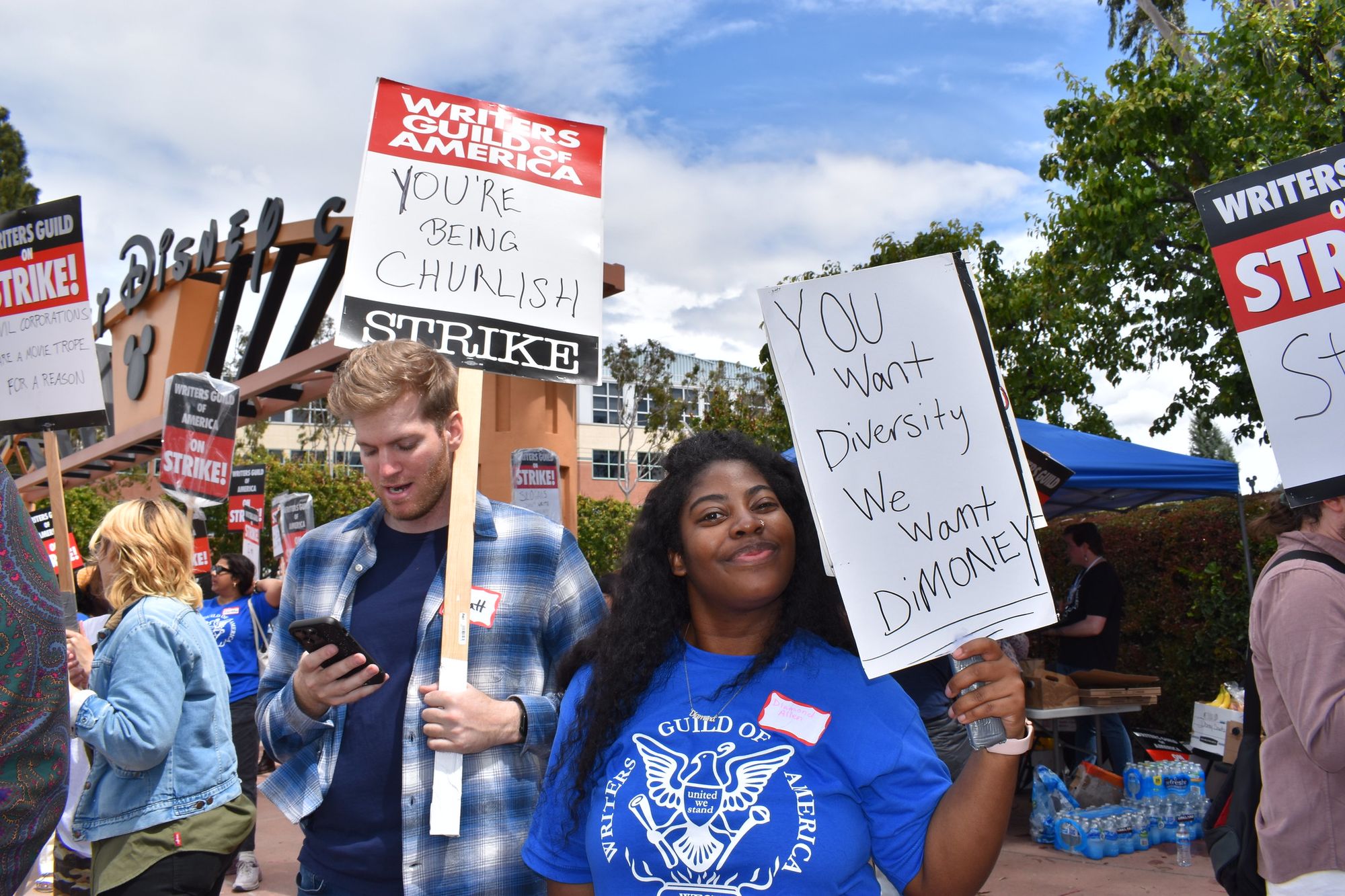
As it has throughout American labor history, the strike proved the power of worker solidarity. It was dazzling to see how much change can be wrought if enough people come together to say, "Nahh, we're not doing this." I hope other industries can take note.
I'm still overwhelmed at our resilience, our generosity, and our ingenuity. Writers and actors really took care of each other. There were multiple worker-support funds. And benevolent bosses who threw their celebrity weight around to raise money (thanks, boss!). But the little acts of caring meant a lot, too: I mean the texts, the emails, the little coffee meet-ups. Everyone checked in on each other. We all love our work so much (NERDS), and our identities are so tied up in being writers (SICK), that going without was, at times, a total mindfuck. Also! Still very moved by the support we got from our friends, loved ones, strangers, those not in the industry. Could be the hormones talking, but I was nearly brought to tears by every passing bus-honk.
Striking while pregnant was a trip. During this strike, I'm sure most of us experienced that stifling, wander-around-the-apartment listlessness. Feeling bad about not cranking out a new pilot, watching TV on a gorgeous day because leaving home in NYC automatically means spending $20. Being pregnant just meant doing all this while double-fisting string cheese.
I'm not gonna lie—it was nice to have a little extra pajama time (especially during my more barfy weeks). And showing up on the picket line with a big ol' bump was amazing. Loved 2 parade da bump. Lots of jokes about being "pro labor" and referring to my uterus as "the only good mini room." I can't wait to proudly show my baby those pictures and then have the baby say, "Sorry, my vision is only developed enough to process those high-contrast board books and maybe also your boobs."
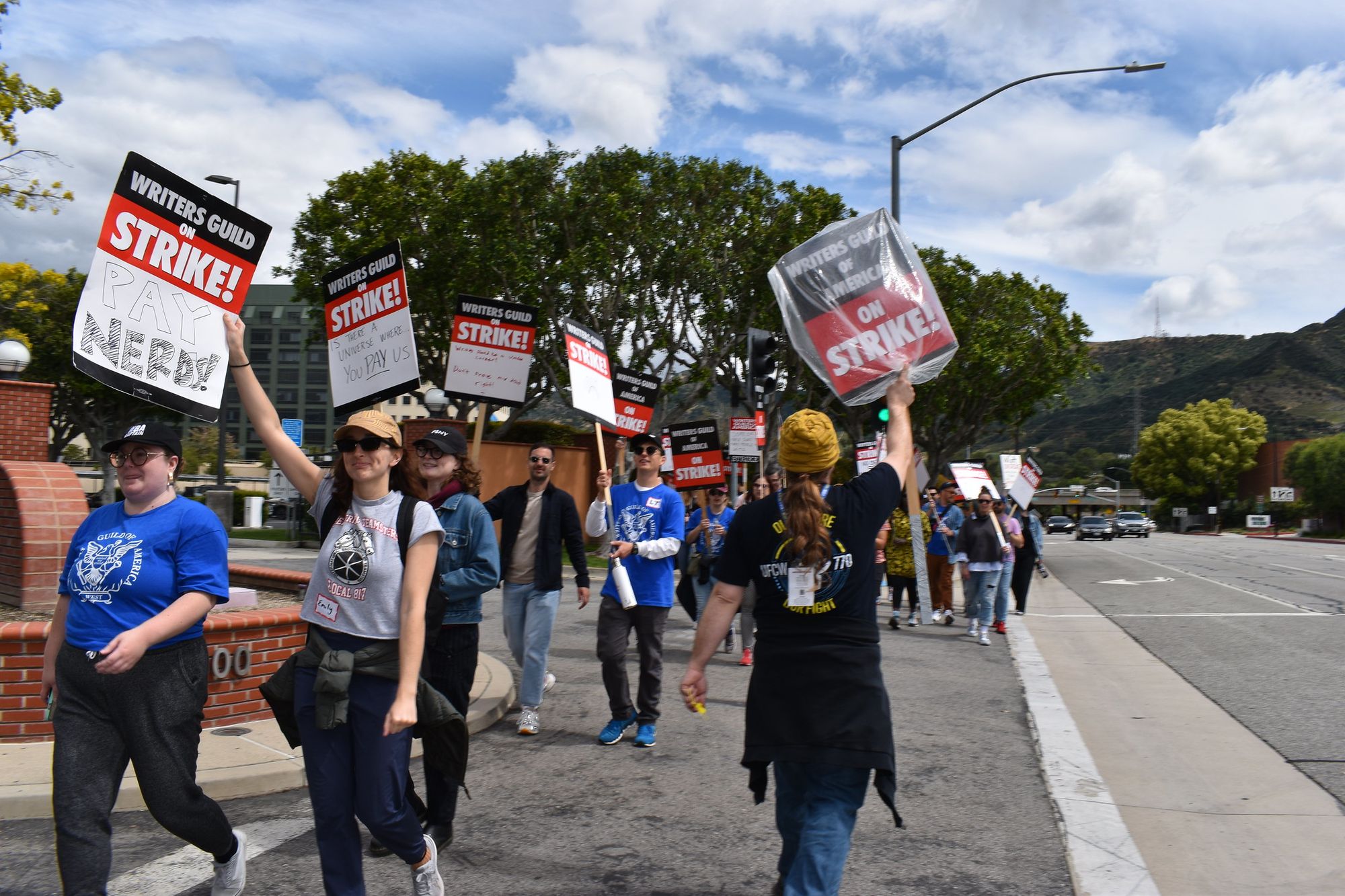
I had full confidence in my union prior to the strike. And they knocked it outta the park like I knew they would. Maybe I'm cynical that there will be some other cockamamie type of industry-threatening technology that we'll need to fight against, but again, I'm confident that we'll be able to handle it.
One day, I was feeling sprightly, so I schlepped my geriatric pregnant ass to Rockefeller Center for a picket that was "pre-WGA" themed. It was mostly young folk: college kids and 20-somethings. They gave some powerful speeches, it was all very hopeful and inspiring and wow I cannot wait to hire/work with these people. BUT THEIR ACTUAL PICKETING? My god, those children SPRINTED. Clearly, those knees are still loaded with cartilage. I made it two laps then had to stop and wheeze and get a bagel. The future is in good hands.
